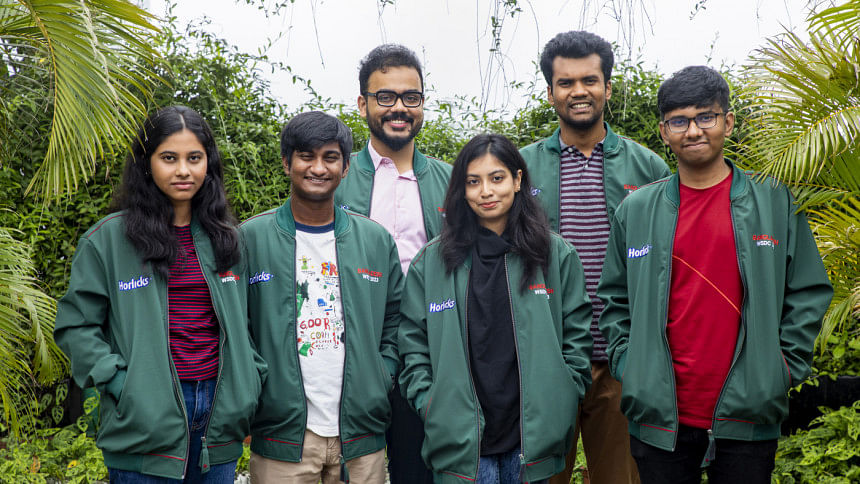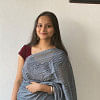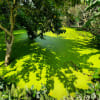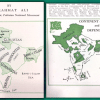Settling the debate

Every year, five feverishly passionate individuals persevere through many rigorous rounds of selections conducted by the Bangladesh Debating Council (BDC) and travel to destinations around the world to wave the Bangladeshi flag at the World Schools Debating Championships (WSDC), the world cup of Debating. This summer, Zahi Wali Aadit, Nazwa Nasheeta Rahman, Robiah Arefin Ibn Mahmud, Sarah Tasneem, and Shayor Khan travelled to Bangkok, Thailand to represent Bangladesh at Asia World Schools Debating Championship (AWSDC), from where they took flight to Hanoi, Vietnam, where they made history at WSDC.
This year marks the first in-person WSDC since the pandemic. It was also the largest WSDC ever hosted with 64 competing nations. The team from Bangladesh broke third, right after India and the USA.
The team
Robiah Arefin Ibn Mahmud, from Mastermind School, has been debating since class five, having overcome the early challenges of a stutter and social anxiety. During the Covid-19 lockdowns, Robiah reached out to prominent debaters in the community, watched lectures, and participated in practice matches with other school teams, known as spars, over Discord. Outside of debate, Robiah produces music, he had 92 subscribers on Spotify at the time of our interview, plays chess, and writes.
Zahi Wali Aadit's school, Sir John Wilson School, did not initially offer debating. He gained inspiration to debate from his father, a successful TV debater in his own school days. As an extroverted and outgoing person, Aadit thought that being able to talk for a while would be nice. In 2020, he founded Wilsoners' Debating Association with two of his friends. Aadit loves football and confessed that part of his motivations to get to WSDC was to meet the teams from Spain and Argentina.
Sarah Tasneem from Scholastica Uttara, described her journey to be "long, slow, and incredibly agonising". Inspired by her older brother who had won pre-worlds, the national championship, she started debating at age fourteen. During lockdown, she met her two teammates from school online, and the three of them would go on to win the national championship two years consecutively (2021 and 2022).
Nazwa Nasheeta Rahman, also from Scholastica Uttara, won "open best speaker" in her very first tournament. Lockdown prevented her from accessing coaching from her school club, and thus, Nazwa and her friends would get together on Discord every night and teach themselves to debate by watching lectures, breaking down debate motions, or debating amongst themselves. In the years following, Nazwa, along with her national teammate Sarah and another debater from her school, Progga Parmita Rupkotha, won the national championship in both 2021 and 2022. Nazwa is proudly of the opinion that Uttara is genuinely a great place to live.
Shayor Khan is the captain of the team. He is a recent graduate of DPS STS School, currently residing in California to attend university at UC Berkeley. A third-time returning member of Team Bangladesh, Shayor performed so badly (according to him) in his first pre-worlds that he quit debating for the next four years. During lockdowns, his mom urged him to return in order to enhance his extra-curricular profile for universities. He made the team in 2021, fell in love with the sport, and met his now closest friends. Shayor was awarded 4th best open speaker, and 3rd best ESL (English as a second language) speaker overall at the WSDC.
The coaches
Sourodip Paul is a consultant at the World Bank and a board member of Bangladesh Debate Council (BDC). He is a two-time coach of Team Bangladesh, and winner of the World University Debating Championships 2022 and Australasian Intervarsity Debating Championships 2022.
Sadid Murshed is currently working at Boston Consultant Group. Sadid started debating back in school and continued doing so during university. He formerly coached Scholastica and Sir John Wilson schools.
Nayara Noor is currently working as a teaching assistant at BRAC University and equity officer at BDC. She has formerly coached BUP, Jahangirnagar University, Ideal School & College, and BAF Shaheen College, among others.

We asked the team some burning questions to allow us to experience Vietnam vicariously through accounts of their travels.
Rising Stars: How has representing the country on the global stage changed you and your perspectives?
Robiah: Coming from Bangladesh, we tend to underestimate ourselves. We interacted with a lot of people, people who are going our dream colleges, and we realised that we are not all that different from them. Perhaps they have more resources, but they are somewhat similar in terms of capability. I learned to believe in myself more, and not discount myself for being Bangladeshi.
Sarah: The most prominent thing for me was the gratitude I developed. I realised that for a lot of us, this is the only time we ever get to represent our country in any capacity. The most pivotal moment was breaking third, watching Robiah wave the flag, watching the large international audience chant Bangladesh over and over and over again, and seeing the response on Facebook from our very small niche debating community.
RS: Can you share some memorable moments from your trips to Thailand and Vietnam?
Shayor: One of the most memorable moments for me was sitting in a hotel lobby in Bangkok late at night with a lot of the other teams. We sat in a circle and chatted away. It was phenomenal, extremely smart people from different corners of the world brought together for their love of this one activity, having these incredible conversations with our diverse backgrounds and perspectives.
RS: Did you face any disparity in terms of the resources you had access to compared to other countries?
Aadit: You have a sense of disparity when you're talking to India, USA, Canada, etc. because of their abundance of resources, but at one point you realise that it's not about the sheer quantity or expense of resources, but the quality. We had a world champion directly coaching us, we had guidance from WSDC alumni, and WSDC had a lot of Bangladeshi debaters involved, who are some of the bests in the world. Armenia's three coaches were from Bangladesh, and Qatar had two Bangladeshi coaches, we were able to communicate with them and they were always giving us help and support, this made us feel supported and an integral part of the community.
RS: What do you think contributed to these kids performing the best in WSDC in Bangladesh's history?
Sadid: I think this year's performance was a result of three factors: who they are as people, mindset, and training. All five kids were very driven, open to collaboration and receptive to feedback. Shayor has been in the team for the past three years, it was his last chance to leave a legacy. It was the last chance for Aadit, Nazwa, and Robiah as well. Sarah has been working toward this for so long, the win was a long time coming for her.
RS: As one of the decision makers for team Bangladesh selection, please share insider insight on what qualities you look for and what aspirants should know.
Sourodip: Whenever someone works hard, it shows. We can see the effort you put into your speeches, and what topics you have researched. We value this. To prepare yourself, all necessary resources are available online. You can watch WSDC and WUDC matches and choose to model your speeches after successful debaters.
RS: Please share any initiatives that you or Bangladesh Debate Council took to increase access, diversity and inclusivity in the debating circuit for minority students such as girls and students from outside Dhaka and/or Chittagong.
Nayara: To boost participation by female debaters, we annually host a tournament by girls for girls called Fempowerment, previously known as Shevolution. The top ten speakers get access to a national camp and a special training programme. We regularly collaborate with circuits outside of Dhaka to host BDC-partnered tournaments, take sessions, conduct outreach, etc.
To finish off this engaging conversation, we asked the debaters to leave some sage words for aspiring debaters.
RS: What would you want all the kids who are currently working toward their dream of representing Bangladesh at the WSDC to know?
Sarah: It's hard, there is no trick to doing this. Most people have to persevere through losing over and over again, as I did, which is possible if you really love and enjoy the activity.
Sadid: If you get as far as camp, differences in debating ability between you and your competitors are marginal. At that stage, being collaborative and willing to learn by being malleable and receptive to feedback will be much more in your favour.
Nazwa: For a lot of people, the dream is to get into team Bangladesh, there is nothing beyond that. The dream shouldn't be that, it should be to win WSDC, and I'm counting on whoever is reading this interview to do that. Aim high, you have nothing to be afraid of.

 For all latest news, follow The Daily Star's Google News channel.
For all latest news, follow The Daily Star's Google News channel. 








Comments